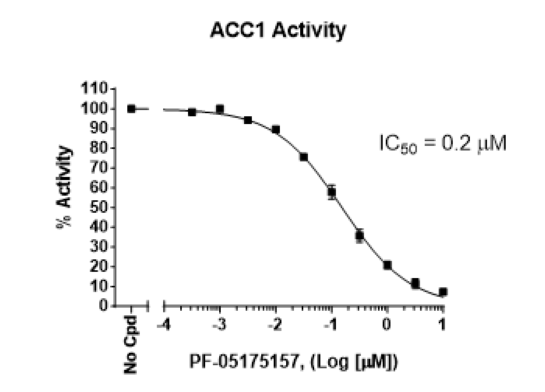Acetyl-Coenzyme A Carboxylase 1 (ACC1) Assay Kit
The Acetyl-Coenzyme A Carboxylase (ACC1) Assay Kit is designed to measure ACC1 activity for screening and profiling applications using ADP-Glo™ as a detection reagent. The assay kit comes in a convenient 96-well format, with enough purified recombinant ACC1, ATP, acetyl-CoA, sodium bicarbonate and assay buffer for 100 enzyme reactions.
Need us to run inhibitor screens or profile your compounds against Acetyl-Coenzyme A Carboxylase 1 (ACC1)? Check out our Metabolic Enzyme Screening Services.
This product has been cited 4 times.
- ADP-Glo™ Kinase Assay (Promega #V6930)
- Microplate reader capable of reading luminescence
- Adjustable micropipettor and sterile tips
| Catalog # | Name | Amount | Storage |
| 50202 | ACC1, FLAG-His-Tags* | 10 µg | -80°C |
| 79283 | 5x ACC Assay Buffer | 1 ml | -20°C |
| 79686 | 500 µM ATP | 100 µl | -20°C |
| 2 mM Acetyl-CoA | 25 µl | -20°C | |
| 1M Sodium Bicarbonate | 75 µl | -20°C | |
| 79696 | White 96-well plate | 1 | Room Temp |
*The concentration of the protein is lot-specific and will be indicated on the tube.
ACC1 (acetyl-coenzyme A carboxylase 1) is one of two isoforms of acetyl-CoA carboxylase. It is cytosolic and it is involved in ATP-dependent carboxylation of acetyl-CoA to malonyl-CoA, the rate-limiting step in de novo fatty acid synthesis, and it is found predominantly in the liver and adipose tissue. Its function is regulated by phosphorylation, allosteric regulators and other proteins, in response to the energetic needs of cells. Acetyl-CoA is at the crossroads between multiple metabolic pathways, so ACC1 has an impact in the formation of building blocks for new cells and in the response to metabolic stress. ACC1 has been linked to several diseases, such as cancer, diabetes, NAFLD (non-alcholic fatty liver disease) and obesity. Inhibition of ACC1 by TOFA (5-tetradecyloxy-2-furoic acid) can result in complete blockage of DNL (de novo lipogenesis) and may be a potential therapy for patients with NAFLD. The development of inhibitors specific for ACC1, for instance by targeting their catalytic domains or dimerization, may prove beneficial in the treatment of ACC1-related diseases.
Tong L. J., 2006 Cell. Biochem. 99(6):1476-1488.
Li S., et al., 2022 Nature Communications 13: 3998.
Wang Y., et al., 2022 Front Oncol. 12: 836058.


